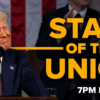All across the country, Americans are facing staggering gasoline prices, pinching their wallets even further as inflation runs rampant. But what’s causing gas prices to skyrocket?
The Biden administration blames Russian President Vladimir Putin’s war on Ukraine, as well as greedy U.S. business owners, for the sharp rise in prices. But that doesn’t pass the smell test for Katie Tubb, a senior policy analyst for energy and environmental issues at The Heritage Foundation.
“I think it’s incredibly disingenuous for the administration to say that, in part because Americans aren’t stupid and they saw prices go up before Russia invaded Ukraine,” Tubb says. “And so I find that, honestly, a very discouraging characterization by the Biden administration.”
Tubb joins “The Daily Signal Podcast” to discuss what’s really causing soaring gas prices, and how the Biden administration needs to respond to fix it.
We also cover these stories:
- Sen. Josh Hawley, R-Mo., criticizes Supreme Court nominee Ketanji Brown Jackson for her writings and rulings on sex offenders.
- The Justice Department announces charges against five people accused of acting on behalf of Communist China and stalking, spying on, and harassing American citizens.
- The New York Times reports that the laptop left by Hunter Biden in 2019 in a Delaware repair shop, and its contents, are authentic.
Listen to the podcast or read the lightly edited podcast below.
Douglas Blair: My guest today is Katie Tubb, senior policy analyst at the Institute for Economic Policy Studies here at The Heritage Foundation. Katie, so glad to have you on the show today.
Katie Tubb: Thanks for inviting me into the conversation.
Blair: Gas prices are just insane. We have seen these massive price hikes in the last couple of months, and it seems like every week we get a higher amount of payment that we have to pay for gas. You recently wrote a paper titled “What’s Driving Up Gas Prices—and Why the White House Won’t Help.” So answer the question, why won’t the White House help and what is driving up gas prices?
Tubb: Right. So there are a variety of inputs into gasoline prices. There are things like state and federal taxes. So depending on what state you live in, you’re going to pay more taxes. California is a really good example of very high taxes. And a lot of that has to do with their environmental choices to heavily tax gasoline.
Then there’s refineries and actually taking crude oil and turning it into a useful product like gasoline. That’s generally a stable contributor to gasoline prices. However, refineries are also under a lot of pressure that increases prices.
For example, there’s a federal ethanol mandate that increases prices on refineries to comply with that mandate. There are things like other environmental regulations as far as how these refineries operate and do business that increase prices. These are policy choices.
There’s another component to gasoline prices and that’s the actual transportation, distribution of gasoline from the refinery to the customer. And depending on where you live, that price can be much higher than elsewhere.
For example, California, again, or the Northeast, they have again made policy choices to restrict their pipeline capacity. They don’t like pipelines. And so what these regions have to do is rely on shipping. There’s a very old law in the United States called the Jones Act which severely restricts our shipping capabilities and what is a Jones Act-compliant ship. And so that, of course, increases prices. And so if you’re making these policy choices to reduce pipeline capacity, you’re opting for more expensive routes of transportation.
And then the final big and most important contributor to gasoline prices is crude oil. Crude oil is the raw natural resource that gets refined into gasoline. So when crude oil prices go up, gasoline goes up. And that’s where we get into a whole array of policy choices and geopolitics that feed into the increase of oil that we’ve all been seeing and now paying for. That’s a bigger part of the conversation. I’m very happy to go into that.
Blair: Definitely. And it does sound like [the] word that popped up a couple of times was “policy,” there’s a conscious decision. So the Biden administration has attempted to justify these prices, these skyrocketing gasoline prices, by saying, “Oh, it’s not our fault, it’s the war in Ukraine. It’s not our fault, it’s the greedy oil companies that are trying to fleece the American people.” Is there any truth to these at all, these excuses, or is it mostly focused on the Biden administration?
Tubb: I think it’s incredibly disingenuous for the administration to say that, in part because Americans aren’t stupid and they saw prices go up before Russia invaded Ukraine. And so I find that, honestly, a very discouraging characterization by the Biden administration.
To that end, President [Joe] Biden has made it no secret from Day One of his presidency that he doesn’t see a future for coal, oil, or natural gas in this country in the long term.
Policy has consequences. And to date, President Biden and his administration have made policy decisions at the top level, at the microphone, and at the regulatory level to say, “You have no future in this country.” They are backing up that statement with regulatory standards and restrictions that are telling the industry it is not worth the risk of investing long term in infrastructure and employees to produce the energy that Americans need.
So I think they’re being very consistent. And unfortunately, even in the current situation, they haven’t even pressed the pause button on the regulatory side of things. They just continue to march forward. And it comes from this vision of the administration to say, “We don’t need oil, coal, natural gas. What we should be doing is ramping up wind, solar, electric vehicles.”
And I think where we’re coming at from Heritage is all of these should be on the table. The American people are incredibly innovative. We have incredible energy resources. We have abundance if we’re allowed to access it. And so all of these things should be on the table.
But unfortunately, the Biden administration just is doubling down on a very narrow agenda of what the energy sector should be, and with that, what the economy should look like.
Blair: Yeah. As you’re saying, the Biden administration has been very clear, the fact that it doesn’t like things like fracking or mining for our resources. I mean, specifically, we can look at the Keystone pipeline that was shut down under President Biden’s watch. How much is that impacting current issues with gas prices? Do those things have a direct connection or is it something that’s sort of a domino effect of that type of policy?
Tubb: I think they have a direct effect. I’ll give you an example. So last week we saw President Biden announce a ban on Russian imports. Oil prices went up globally, again, because oil is a globally traded commodity.
And I think what markets were doing, they were factoring in some uncertainty about what supply was going to look like. What were the ramifications of this decision? So prices are reflective of political decisions, of uncertainty about markets. So we saw prices go up.
And then they started to moderate for, I think, a couple reasons. One, the political ramifications of that decision were not as disastrous as some thought. The EU didn’t follow the United States. So we didn’t see huge market disruptions. We also saw the [United Arab Emirates] give overtures to OPEC, saying, “Maybe we should increase production.”
My point is those political statements have implications for prices.
So if President Biden, for example, decided to totally change course and grant that permit for Keystone XL pipeline, I think we would see a response in the market. It sends an important signal to both energy producers and especially their investors that the U.S. is open for business and the administration is not putting a target on your back. And I think that has price implications.
We saw the exact opposite of that with the Trump administration. The Trump administration used both the bully pulpit and the regulatory infrastructure to say, “Open it all up.” And we saw the price implications of that. So I think it’s very helpful to compare the two side by side. Policy has implications, and I have no doubt that we’re seeing that in the prices right now.
Blair: Rather infamously, Secretary of Transportation Pete Buttigieg has recently made statements about, “Well, Americans can just reduce their gas prices if they go electric, if they get an electric vehicle.” What are your thoughts on that kind of rhetoric coming out from the White House?
Tubb: A couple things. First, electricity prices have been going up. So that’s not a bulletproof solution. Second, I think it’s quite condescending for a secretary of transportation to tell Americans that this is the all-American vehicle that they should choose.
America, I think, has thrived on a competitive market economy where customers can choose what makes sense for their family, for where they live, frankly, the weather conditions where they live. And so I think we benefit from having competition in transportation choices rather than a secretary of transportation telling me this is what you should buy.
So I think there’s a mix that’s incredibly tone deaf and it doesn’t match up with what Americans are feeling right now, which is energy prices that are increasing across the board, including electricity.
Blair: Now, looking at the consequences of oil production in the United States where the Biden administration, as you’ve been saying, is not friendly toward that type of energy production here at home, PolitiFact, which is by no means a conservative fact-checking outlet, wrote that America produced 11.185 million barrels of crude oil per day in 2021, compared with 11.283 million a year earlier under [former President Donald] Trump. And it also noted that the amount produced in Biden’s first year exceeds the average daily amount produced under Trump from 2017 to 2018, according to data from the U.S. Energy Information Administration.
Do you think that if we were to maybe reverse course and to create more oil infrastructure and create more oil production at home this might fix some of these energy problems and gasoline prices that we’re seeing?
Tubb: Absolutely. A couple things. It’s interesting to compare 2017 to 2021. 2017, you could argue we were in a bit of a hangover from the Obama administration, which is very similar to where President Biden is trying to take us now.
You could also, if you want to look at 2020 versus 2021, I think we all remember in 2020 we were facing this thing called the COVID-19 virus and you saw markets tank as demand and supply tried to figure out what in the world was going on. So I don’t think the 2020/21 comparison is helpful.
As far as 2021 production, it is ironic to me that President Biden wants to take credit for production in 2021 when he has said every single day of this administration that he doesn’t want these industries to exist in the future.
So you can’t speak out of both sides of your mouth like that. Either you are responsible for that and you are willing to back it up with policy or you should say, as he’s been trying to with his actions but not with his words, “We’re not doing that anymore and I have the American people behind me.” I don’t think that’s the case, but you can’t speak out of both sides of your mouth there.
Blair: We’ve been seeing that the price of gas and the price of energy has been affecting other sectors of the economy, but would you be able to go maybe a little bit more in-depth about some of those consequences that other sectors of the American economy have suffered as a result of these issues?
Tubb: Yeah. Energy is known as the “master resource,” and that’s because energy is needed for basically every good we produce, every service we engage in.
If you think about it, just what you did today to get to work or to cook a meal, or to get your kids to school, or do your homework on your computer, all of that involves energy. And so when energy prices go up, basically prices across the economy go up; whether you’re talking about transportation of getting from A to B or you’re talking about producing food or manufacturing the sporting equipment you plan to use this afternoon after school.
And so it’s this ripple effect of increasing prices even just very remotely connected to energy. It all uses energy at some point. And so that’s where we’re seeing the ripple effect.
What I’m particularly concerned about is food prices. When you think about a farm, a farmer not only uses tractors, which need fuel, but you think about fertilizer, which is a byproduct of oil and gas. When you think about growing all that requires energy. When you think about then shipping that to a place to process it, to package it, again, all of that is energy.
So there are multiple entry points at which food prices intersect with energy, and it’s this bubble effect of higher and higher prices to pay for the actual production of that food.
Blair: Due to these increases in, as you mentioned, kind of everything across the board, Americans are kind of suffering at all levels, in food and gas and all of these other sectors of their lives. The fact that these prices are so high is starting to cause a problem. So states have decided to get in and maybe try and fix things.
So a report from Mercury News says that members of the California State Assembly are planning to introduce a measure for a $400 gas rebate specifically for Californians. Do we have any other examples from across the country of states taking action to alleviate some of this suffering from these high prices?
Tubb: Well, I think there is a significant contrast between federal and state policy.
You look at states like Texas, which are very friendly toward energy. And so not only do they have a lot of energy production, they have excellent infrastructure to connect producers with consumers. And the result is consumers pay lower prices. Granted, those prices are still too high right now, but I think that has everything to do with federal policy.
In the case of California, you’re seeing Biden-esque policies that have been on the books for years at this point and I think it’s fair to say Biden is trying to take the California model to the rest of the country.
So the fact that California is contemplating a change to some degree of policy I think is a very positive thing because it helps reframe the conversation. It helps explain why some of these prices are hurting Californians more than pretty much anyone else in the country, and is an opportunity to right-size some of the more problematic inputs of that energy price.
So let’s just say I think there’s a mix of state and federal here. I think some states are doing it far better than others. And then at the end of the day, the federal government can do a lot to ruin whatever progress states have made by way of this regulatory infrastructure.
Blair: So we’ve discussed what the federal government can be doing. We’ve discussed maybe some of what the states can be doing as well. What can lawmakers, maybe in Congress, be doing sort of at a legislative level to right this ship?
Tubb: Yeah, I think there’s so much that can be done to reduce barriers to energy production and energy use. I talked about the Jones Act. I think that’s a low-hanging fruit. Fix that problem. Get rid of the Jones Act, or at least create relief there. The ethanol mandate I talked about. The Renewable Fuel Standard, I think that’s another example.
I think a very important role for Congress is to play the role of accountability on the administration. So much of what’s being done right now is through the regulatory apparatus, whether we’re talking about Department of Transportation, [Environmental Protection Agency], Securities and Exchange Commission.
At a minimum, Congress needs to be amplifying that as a problem and helping the American people understand that the administration is running away without the support of the American people to this very extreme vision of what energy and the economy should be. I think there’s a lot of regulatory fixes that would crawl back some of that power and bring it back to Congress.
There’s probably a little more in the weeds than this conversation wants to go, but I think Congress has a great role to play in that role of accountability to the administration that needs to be done. Congress is not a helpless party in this situation. Certainly, the administration has a lot of cards in its hands that it can play, but between now and the next couple of years, I think Congress needs to be a voice for the American people.
Blair: As we wrap-up here, let’s look toward the future. Should Americans be expecting to pay any less at the pump in the next couple of weeks, months?
Tubb: I think the solution for the Biden administration is very simple. It is not easy for them. They need to totally change course. Until they do that, I don’t see a lot of relief for Americans. They’re saying one thing, but then they’re doing another. They have to be willing to change what they’re doing for Americans to see any kind of relief at the pump.
Blair: That was Katie Tubb, a senior policy analyst at the Institute for Economic Policy Studies here at The Heritage Foundation. Katie, thank you so much for your time.
Tubb: No, thanks for having me.
Have an opinion about this article? To sound off, please email [email protected] and we’ll consider publishing your edited remarks in our regular “We Hear You” feature. Remember to include the url or headline of the article plus your name and town and/or state.
































